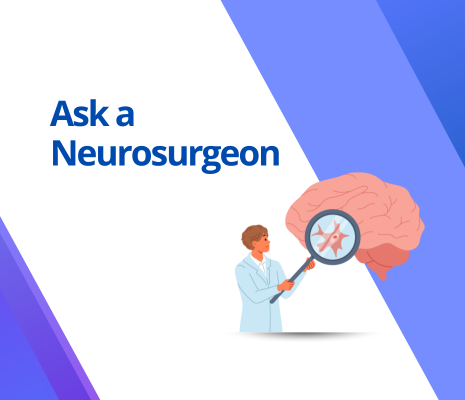The brain and nervous system are incredibly complex, which is why so many people have questions about them. When in doubt, it’s always helpful to ask a neurosurgeon for expert guidance and clarity. Neurosurgeons are the medical professionals who specialize in diagnosing and treating issues related to the brain, spine, and nervous system, helping patients understand their condition and choose the right treatment path.
Whether you’re wondering about the symptoms of a neurological condition or when surgery might be necessary, this blog will answer some common questions about neurosurgery and brain health.
1. What Does a Neurosurgeon Do?
A neurosurgeon is a doctor who specializes in surgery to treat problems with the brain, spine, and nerves. These doctors perform operations to help treat conditions like brain tumors, spinal injuries, severe back pain, and even epilepsy. They are experts in understanding how the nervous system works and how to fix problems when things go wrong.
2. When Should I See a Neurosurgeon?
You might need to see a neurosurgeon if you’re having symptoms like:
- Severe headaches or migraines
- Dizziness or balance problems
- Numbness or weakness in the arms or legs
- Trouble speaking or understanding speech
- Seizures that aren’t controlled with medication
- Chronic back pain or neck pain that doesn’t get better with normal treatments
If you experience any of these symptoms, it’s a good idea to talk to your regular doctor, who can refer you to a neurosurgeon if needed.
3. What Are Some Common Conditions Treated by Neurosurgeons?
Neurosurgeons treat a wide range of conditions, including:
- Brain tumors (both benign and cancerous)
- Spinal problems like herniated discs and spinal stenosis
- Traumatic brain injuries (TBIs) caused by accidents or falls
- Severe back or neck pain
- Seizures that can’t be controlled by medication
- Chiari malformation, where brain tissue pushes into the spinal canal
If you have any of these conditions, a neurosurgeon can evaluate your case and recommend the best treatment.
4. Are Neurosurgeries Always Necessary?
Not all conditions require surgery. In many cases, neurosurgeons will recommend non-surgical treatments first. These can include:
- Physical therapy to strengthen muscles and improve movement
- Pain medications to control discomfort
- Injection treatments to relieve pain and inflammation
Surgery is typically considered only when other treatments have not worked or if the condition is serious and could worsen without surgery.
5. What Happens During Neurosurgery?
Neurosurgery can sound scary, but it’s often a safe and effective way to treat serious conditions. The type of surgery depends on what’s being treated. Here are a few common procedures:
- Craniotomy: A procedure where part of the skull is removed to treat brain conditions like tumors.
- Spinal fusion: This surgery joins two or more vertebrae in your spine to reduce pain and prevent further damage.
- Minimally invasive surgeries: These are done with small incisions and special tools to reduce recovery time and lower the risk of complications.
Your neurosurgeon will walk you through the surgery, explain what to expect, and discuss any risks.
6. What Is Recovery Like After Neurosurgery?
Recovery depends on the type of surgery you have. Some people may be able to go home the same day, while others may need to stay in the hospital for a few days. Most people will need to rest and follow their neurosurgeon’s advice carefully. Recovery may include:
- Pain management: You may be given medication to control pain after surgery.
- Rehabilitation: This might involve physical therapy to regain strength and movement.
- Follow-up appointments: These help your doctor monitor your progress and make sure you’re healing well.
- Lifestyle changes: Depending on the surgery, you might need to avoid heavy lifting or make other adjustments to your daily activities.
7. Can Neurosurgery Help with Brain Injuries?
Yes, neurosurgeons are key in treating traumatic brain injuries (TBI). These can occur due to accidents or falls and may require surgery to relieve pressure on the brain, remove blood clots, or repair damaged tissue. Surgery is often needed in serious cases, but mild injuries may not need surgery and can be treated with other medical care.
8. Are There Non-Surgical Treatments for Brain and Spine Issues?
Yes! Many neurological issues can be treated without surgery. Some non-surgical treatments include:
- Medications to manage pain, inflammation, or seizures
- Physical therapy to help with movement and strength
- Injections to relieve pain, especially in the spine
- Lifestyle changes like improving posture or losing weight can also make a big difference.
Your neurosurgeon will help you decide whether surgery is needed or if these other options might work for you.
9. How Does Technology Help in Neurosurgery?
Technology plays a huge role in making neurosurgery safer and more effective. Some of the tools used include:
- MRI and CT scans: These give neurosurgeons a detailed look at the brain and spine before performing surgery.
- Robotic surgery: This allows for more precise movements, smaller incisions, and quicker recovery.
- Navigation systems: These help surgeons plan and perform surgeries with incredible accuracy, lowering the risk of complications.
Advances in technology mean that neurosurgeons can perform safer surgeries with better outcomes.
10. Can Neurosurgeons Treat Mental Health Issues?
Neurosurgeons mainly focus on physical problems with the brain and nervous system, but in some cases, they might treat mental health conditions like severe depression or obsessive-compulsive disorder (OCD). For example, deep brain stimulation (DBS) is a technique sometimes used for patients with conditions like depression or Parkinson’s disease when other treatments haven’t worked. However, most mental health issues are treated by psychiatrists or psychologists.















